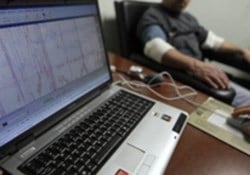
Top stories






More news














Reg Horne, managing director of national private investigation agency, Justicia Investigations, points out that in the past polygraph testing was seen as a method of rooting out culprits during in-house investigations into theft, fraud or even sexual harassment. However, employers are now taking proactive rather than reactive routes. "While, five years ago, just 10% of companies we dealt with considered pre-employment polygraphs, now up to 60% are using this method to screen potential new employees," he says.
"The reason for this is that prevention is easier and far cheaper than solving a problem further down the line," says Horne.
Pre-employment polygraph testing is particularly useful in the banking, security, insurance, retail, hospitality, manufacturing, construction, logistics and transport sectors. Entertainment venues - including casinos that test staff such as croupiers - are also regular clients at Justicia.
Frans van Biljon, one of Justica's highly qualified and experienced polygraphists, says that although many employees in high-risk industries are dismissed for dishonest acts as a result of disciplinary action, most companies don't prosecute. This means they are not blacklisted and don't have criminal records, so any checks often come up blank. This is exacerbated by the fact that a very low percentage - only 6-13% - of criminal charges actually end in prosecution.
Fellow polygraphist, Willem Marshall, cautions that companies tend to believe that theft, fraud and corruption won't affect them. "They need to realise that there is a great deal of organised crime out there and that they are being targeted. Syndicates often infiltrate organisations by either arranging a syndicate member to be employed there, or more often, buying over a current employee who might have a clean track record up to that point. Intelligence is everything and criminals share information. Our experience shows that a high percentage of company crime is perpetrated by employees or in collusion with employees."
Van Biljon says that far more people pass polygraph tests than fail - and before even taking a test, up to 80% admit to a misdemeanour.
A workplace polygraph test is nothing like the controversial "lie detector tests" depicted in movies and on television crime channels. Instead, it is a sophisticated system that brings together "a parcel of issues" that not only include the graphs and charts produced by the computers to which candidates are connected but also a host of verbal and non-verbal communications.
Van Biljon says that Justicia screens job applicants for a number of major security companies. Shockingly, the pass rate is very low. "One of our clients had checked an applicant for a criminal record using his ID number. He came back clean and all his references checked out. However, he failed our polygraph test. Upon investigation, it was discovered that the applicant had used a false ID number and had pre-planned all his references. We also discovered that he was actually out on parole and was a well-known criminal!"
He said the position for which he had applied was a highly responsible one in the company's control room. "Not discovering this information could have led to the leaking of crucial and confidential information such as alarm details, codes, addresses as well as details of when property owners were away. He could also have manipulated alarms and reaction times, allowing thefts to take place while covering up for the syndicate for which he was working."
Marshall added that syndicated crime in the transport sector was rife. "Syndicates either attempt to bribe and intimidate drivers and their assistants or actually place members as employees. Often thefts reported as hijackings are found to be "handovers" where a driver has voluntarily handed over a consignment for cash or been intimidated to do so and we have been able to recover millions of rands worth of stolen stock."
Van Biljon says that polygraph tests don't just uncover major crimes. They often pick up drinking and drug related problems as well as petty offences. "The most important thing to remember is that, if an individual has stolen once, and left unchecked, this could lead to an employee committing more serious offences in the longer term."
Polygraph tests are completely voluntary and an applicant must give written consent. Each candidate is prepared and shown how the polygraph equipment works, screened for health issues and questions are discussed upfront in order to dispel nervousness.
Horne says questions are prepared according to each company's needs. "In fact, both employees and employers are beginning to see polygraphs as a normal part of the employment process," he says.